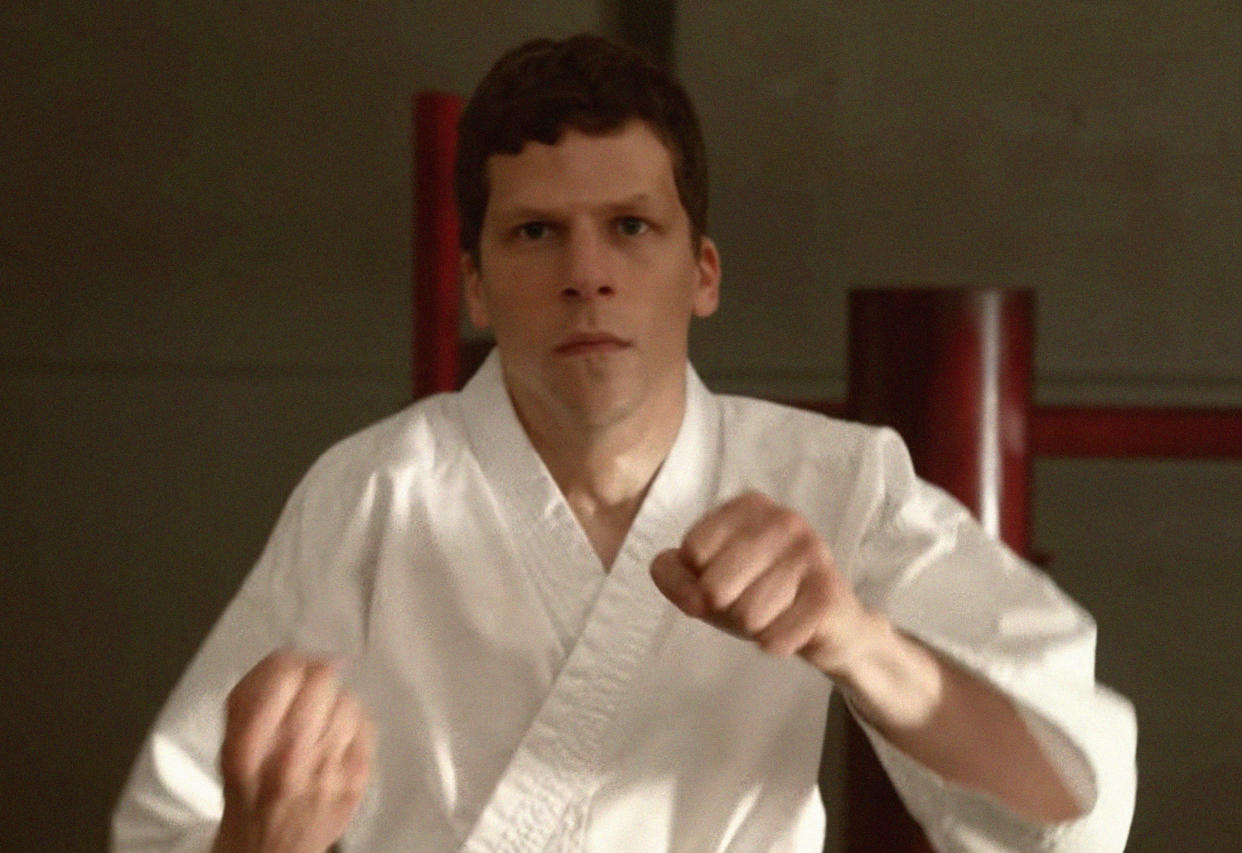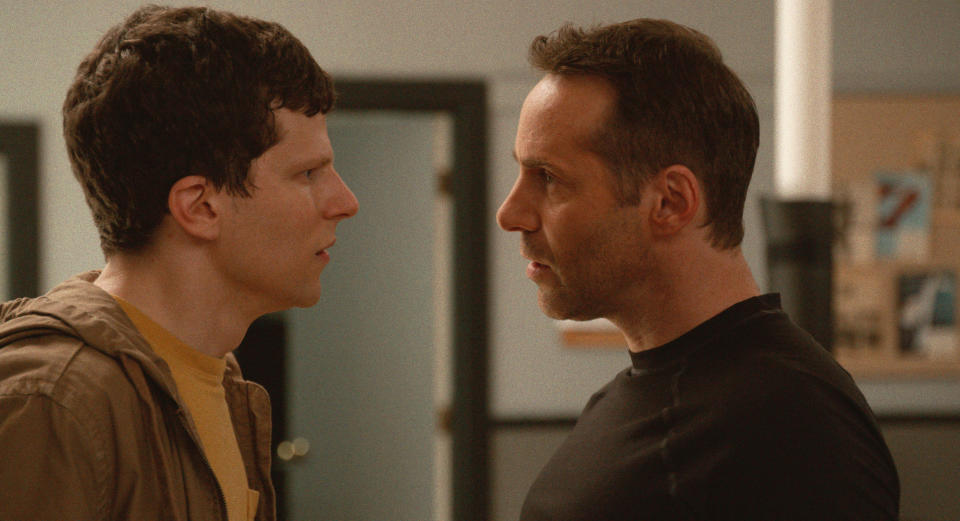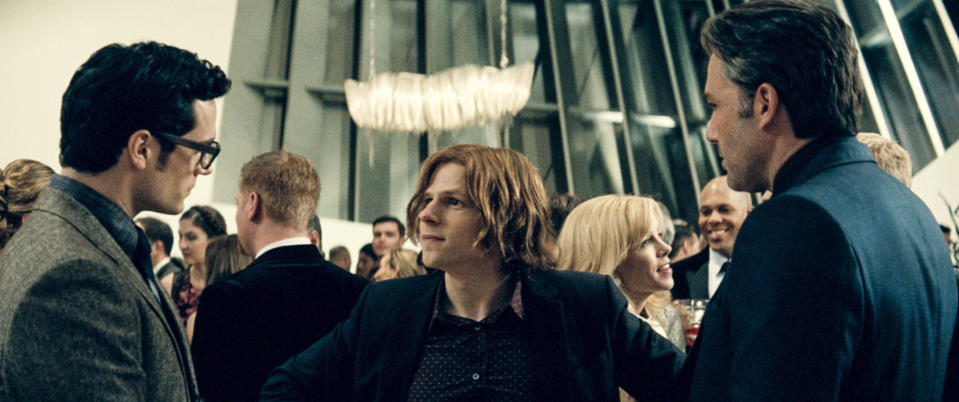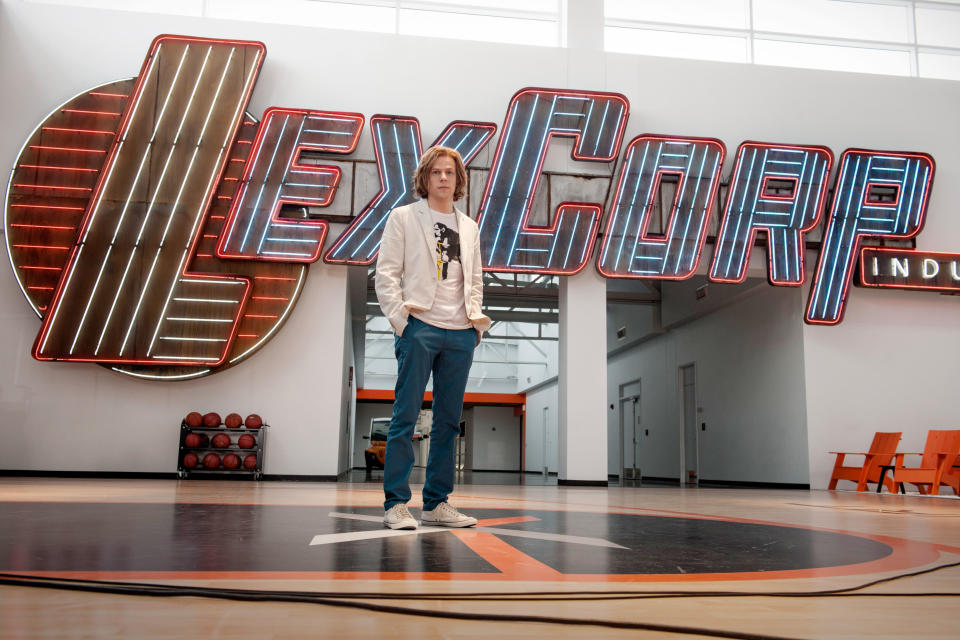'The Art of Self-Defense' star Jesse Eisenberg discusses toxic masculinity and why he loved playing Lex Luthor

Jesse Eisenberg remembers the exact moment that the world changed. On Oct. 5, 2017, the Oscar-nominated actor was in Louisville filming his latest movie, The Art of Self-Defense — a wry satire of toxic masculinity and male aggression. That same day, New York Times reporters Jodi Kantor and Megan Twohey published their seismic Harvey Weinstein exposé that toppled the powerful producer from his Hollywood perch and paved the way for the #MeToo movement to shine a light on misogyny and sexual violence within the entertainment industry.
“Everybody in the cast and crew was reading this story about these horrific crimes that were committed against our colleagues,” Eisenberg tells Yahoo Entertainment. “And then we would walk to set and be filming this movie about misogyny and sexism and the horrible things that men can do if unchecked. The movie took on this kind of strange new relevance.”
Even before the Weinstein story broke, Eisenberg says he had been increasingly aware of how the male gaze was seeping into his industry, both on and off-screen. “I’d read movie scripts, and the trick is just read it from the perspective of a woman. Just two pages. Many of them will horrify you. The man walks in and he’s wearing glasses, but the woman walks in and she’s got legs up to here — things are immediately objectifying and sexualizing. That’s always made me really uncomfortable, probably because my girlfriend — now wife [Anna Strout] — told me it was disgusting 20 years ago.”
And the actor stresses that he’s seen significant changes since that October day in Louisville. After wrapping The Art of Self-Defense, Eisenberg started production on The Hummingbird Project and worked alongside two actresses who spoke out in the early days of the #MeToo movement, Salma Hayek and Erika Rosenbaum.
“I was on set with Salma editing her op-ed about Harvey Weinstein for The New York Times, which was set to be published the next day,” he remembers. “And Erika Rosenbaum told a horrific story on the radio about Harvey Weinstein’s abuse. There was also a man on set who had come in to act in a scene for the day, and was fired immediately for making a horrible comment to somebody who worked in the wardrobe department. I remember thinking, ‘This day is crystalizing the changes that are happening.’ Would those two women have been eager to tell their stories six months before? Would this man have been fired six months prior to when we were doing that movie? I think the answer is probably no. That told me that we're moving in the right direction and I'm really excited for that direction.”

While The Hummingbird Project arrived in theaters earlier this year, The Art of Self-Defense is playing around the country now. The sophomore feature from writer/director Riley Sterns casts Eisenberg as Casey Davies, an exceptionally meek accountant who could uncharitably be described as a wimp. Coming home one night, Casey is attacked by a masked gang and badly beaten, spurring him to explore ways of defending himself. He’s thisclose to becoming a gun owner when he finds an ad for a karate dojo run by a charismatic, if eccentric, sensei (Alessandro Nivola). Under his mentor’s tutelage, Casey masters a variety of martial arts moves and acquires the confidence to use them… even in situations where violence isn’t the answer.
His newfound aggression is stoked by the sensei, who has big plans for Casey and wants him to be in fighting shape for what comes next. After a lifetime as an outsider, the diminutive accountant is ready and willing to be part of a team that dishes out punishment instead of taking it. “For the first 10 pages of the script, I thought I was reading a typical sports movie where the hapless protagonist finding his inner confidence through athletics,” Eisenberg remembers. “But it completely subverts and undermines that genre. Casey almost becomes this cult member — a brutish version of a disgusting man.”
Did we mention that The Art of Self-Defense is also very funny? Written and performed with a deadpan absurdity, the film punctures the balloon of self-importance around guys who like to imagine themselves as warrior-savants. In that way, it’s something of a spiritual heir to David Fincher’s 1999 favorite, Fight Club, which also has a wickedly funny streak — even if a section of its fanbase takes it all too seriously. “I imagine it’s possible to watch this movie and not see any of the irony,” Eisenberg allows. “It was written as a personal thing, as opposed to a political statement. [Riley] does jujitsu everyday, so the karate is not used as a punching bag to be mocked. He got sucked into watching violent altercations on YouTube and I think he was just so shocked that they were taped and that people were putting them online, he ended up writing this in part as a response to that.”
Had irony not been baked into the script, though, Eisenberg would never have signed on. Over the course of his career, he’s managed to carve out a unique space by being a part of action-oriented blockbusters — think Zombieland and the Now You See Me films — without ever having to play a traditional badass action hero. “I’m not attracted to those kinds of roles, and they aren’t attracted to me,” he says, laughing. “So it’s kind of a mutual aversion. I like [action movies] where there’s an ironic element to them, because at best they’re a commentary on a violent culture and at worst just kind of benign on the spectrum of action movies. A movie like The Art of Self-Defense has similar elements in terms of comic action, but it’s done from a different perspective. It has a darkness that doesn’t glorify [violence], but shines a light on the absurdity of male aggression.”

Eisenberg even found a way to introduce a pronounced level of irony into the unlikeliest of roles: Superman’s nemesis, Lex Luthor. Having successfully avoided the comic book movie boom for much of his career, the actor signed onto Zack Snyder’s Batman v Superman: Dawn of Justice after the movie’s co-writer, Chris Terrio, decided he could bring something new to the standard role of the supervillain. “Chris had seen a play that I wrote [2013’s The Revisionist] about an obnoxious American kid who goes to Poland, and he pitched me for the part [of Luthor],” he recalls. “And then Zack Snyder allowed me to bring my sense of humor to it, and it turned into something I really loved doing. I imagine not everybody loved me doing it, but I loved it.”
Like Batman v Superman itself, Eisenberg’s portrayal of Luthor is controversial within fan circles. Whereas predecessors like Gene Hackman and Kevin Spacey played the character with a knowing theatricality, Eisenberg portrays him as a boy genius gone to seed. Despite the wealth and power Luthor has accumulated, he’s emotionally stunted with a juvenile sense of humor — witness his taste for Jolly Ranchers or leaving jars of urine in Congress. “I like to keep myself entertained, especially when you’re working on something for six months,” Eisenberg says. “And the things that entertain me are characters that are emotionally and psychologically complicated, and some sense of humor if possible. So I try to bring those things if they’re not distracting or incorrect for the story.”

By the end of Batman v Superman, Eisenberg’s non-traditional Luthor does end up in the traditional place for the designated bad guy — a prison cell. But a post-credits scene at the end of Snyder’s follow-up Justice League adventure teased Lex’s escape, as well as his formation of a team of villains that would include Joe Manganiello’s Slade Wilson. That’s a future face-off that seems increasingly unlikely to come to pass, given that Justice League’s critical and commercial failure resulted in Snyder’s departure from the DC Extended Universe, and the franchise’s soft reboot via successful standalone adventures like Wonder Woman, Aquaman and Shazam!. Although the director has since teased what his direction for the DCEU would have been, Eisenberg says he wasn’t privy to most of Snyder’s plans, which would have involved a Darkside-led invasion of Earth. “From my very outside perspective, those decisions seem to be made by mercurial boardrooms that have nothing to do with me.”
That said, he’s open to returning as Luthor if there’s a place for his take on the character in the revised version of the DCEU. “Not every role in those kinds of movies interest me, but a role like that — irrespective of the movie — is great. The character I got to play in [Batman v Superman] is as interesting to me as a movie like The Art of Self-Defense.”
The Art of Self-Defense is playing in theaters now. Check Fandango and Atom Tickets for showtime and ticket information.
Read more from Yahoo Entertainment:
Jon Favreau reveals how he channeled Walt Disney to remake 'The Lion King'
Ari Aster shares the skull-crushing story behind the scariest moment in 'Midsommar' (spoilers)
Want daily pop culture news delivered to your inbox? Sign up here for Yahoo Entertainment & Lifestyle's newsletter.


